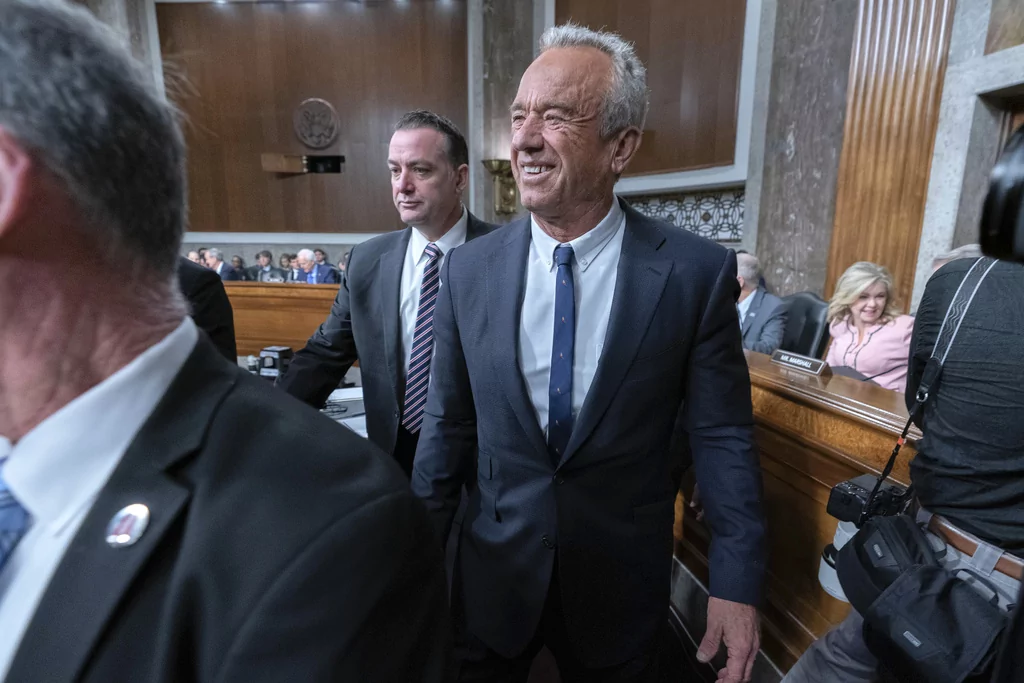Wake up with the Washington Examiner: Solving crime and some nuclear news – Washington Examiner
Ve a clear path in the 2024 election, as highlighted by recent polling and concerns within the Democratic Party. With the election nearing, her strategy to appeal to swing voters, especially Republicans, may not be enough to alleviate fears of losing support from her base. This situation underscores the broader challenges facing the Democrats as they prepare for a competitive election cycle.
In the realm of criminal justice, a renewed interest in district attorney races has emerged, with significant stakes for both local communities and the national political narrative. Various high-profile battles are shaping the conversation about crime and justice reform, as candidates on both sides of the aisle navigate a complex landscape influenced by public safety concerns and the political climate.
On the energy front, nuclear power is experiencing a renaissance, driven by increasing energy demands and shifting perspectives on its role in the future energy landscape. This revival is marked by efforts to revive retired facilities and explore new technologies, such as small modular reactors (SMRs), as the industry seeks to adapt to the changing needs of energy consumption.
these themes reflect a dynamic intersection of politics, energy sustainability, and community safety as the nation prepares for the upcoming elections and navigates the complexities of contemporary issues.
Wake up with the Washington Examiner: Solving crime and some nuclear news
In your district (attorney race)
Former President Donald Trump and Vice President Kamala Harris and their respective parties have wildly diverging messages about the levels of crime plaguing, or not, the country.
Trump regularly paints the United States as a hellscape with big Democratic-run cities as pockmarks on the face of an otherwise big, beautiful land of opportunity.
Harris and President Joe Biden have spent the last four years touting the administration’s crackdown on crime and the falling crime rates to match. It turns out those numbers weren’t quite as good as the FBI was reporting.
Despite the flurry of messaging from the very top of the political food chain, the bulk of enforcing law and order comes down to local police departments and district attorneys. Communities that want to curb crime at home can cast a vote for Trump, or “reform” advocates can support Harris, but for the most immediate effect, they should look to local races.
In the second part of the Washington Examiner’s All Politics is Local series, Supreme Court Reporter Kaelan Deese has a helpful primer for some of the most important district attorney contests playing out this year.
Interest in who is running for district attorney and who is bankrolling him or her has spiked as rumblings about “Soros-backed prosecutors” letting criminals go free as part of a wider criminal justice reform effort have turned into bloody fights on street corners and contentious recalls.
George Soros, the wealthy Hungarian-born businessman and Democratic megadonor, has made it a pet project to back liberal prosecutors who take a soft-on-crime approach to their profession. These prosecutors, who regularly worked to reduce penalties for crimes, refuse to prosecute infractions, and overhaul three-strike rules and cash bail guidelines, were Democratic darlings.
Now, Republicans are putting their own money behind challengers, and even where GOP candidates don’t have any chance of winning, Democrats who are weary of seeing rampant crime go unpunished are putting up fights of their own.
“The trend thus far, even in America’s most liberal cities, has been a retreat from the rogue prosecutor model for criminal justice ‘reform’ that was popularized from 2016 to 2020. It seems unlikely that the trend will be reversed this cycle, even though the Soros network seems determined to keep fighting a losing battle,” Parker Thayer, an investigative researcher at Capital Research Center, told Kaelan.
Here are a few examples of where fights over that retreat are playing out next month on Election Day.
California’s two centers of gravity, Los Angeles in the south and San Francisco in the north, are both holding high-profile contests for their district attorneys this year.
Incumbent Los Angeles District Attorney George Gascon recently survived a recall petition that nearly cut his time in office short. Voters weren’t ready to boot him out of office early, but Nathan Hochman, a former federal prosecutor who has run for office in California before and failed, is trying again.
The Republican-turned-independent is crushing Gascon in fundraising, piling up $4 million to the incumbent’s $700,000.
Up north, voters are familiar with the recall process, having thrown Chesa Boudin out of office in 2022. Brooke Jenkins took over for Boudin and is running for reelection.
Responsive to voters’ concerns, Jenkins has run on public safety and driving up conviction rates.
Despite Boudin getting kicked out less than three years into his tenure, Ryan Khojasteh, who Jenkins fired after she took control of the office, thinks San Francisco will be amenable to a Boudin-style prosecutor again. He is trying to whip up excitement with Boudin’s former base and running on a return to reform platform.
On the other side of the country, there is another fierce fight for a once-removed prosecutor trying to claw his way back into office. Here, Andrew Warren is trying to mount a comeback not from voters kicking him out but after he fought with Gov. Ron DeSantis (R-FL).
DeSantis removed Warren from office when the prosecutor said he would refuse to enforce the state’s abortion law. Prosecutorial discretion is a standard tool in the progressive attorney’s kit.
The governor’s decision to remove Warren faced a legal challenge that was eventually upheld, giving voters another chance to say whether they are comfortable with a prosecutor who has openly acknowledged he is comfortable with picking and choosing the types of crimes he will enforce the law for.
Click here to read about the other prosecutors who could shape the national conversation about crime.
Nuclear option
An explosion in energy demand is forcing nuclear energy skeptics to reconsider everything they thought about the technology and appears ready to reshape the future.
Years of resistance to leaning into mainstreaming nuclear power production appear to be melting away as 2024 gives way to 2025 and the reality of what companies are going to need to do to survive.
Energy and Environment Reporter Callie Patteson has an encouraging rundown this morning about how the future of energy could explode thanks to nuclear.
“Nuclear power has seen a revival throughout 2024, thanks in large part to soaring energy demand from the tech sector. At least two retired plants are set to come back online, one nuclear facility has been saved from closing, and around half a dozen deals have been made for new generation,” Callie wrote.
“Criticized over waste, risk of accidents, and its environmental impact, nuclear energy generation has tended to decline in past decades. However, more recently, support for nuclear energy has risen in tandem with fears about the reliability and stability of the nuclear grid, as artificial intelligence data centers, electrification, and manufacturing developments have caused energy demand to soar. While the Biden administration has sought to accelerate the phase-out of coal and fossil fuels, renewable energy sources, such as solar and wind, have yet to take over as dominant power sources,” she wrote.
The shift back to nuclear is a complicated one. There is no single path forward as scientists grapple with the incredibly steep costs of restoring decades-old nuclear facilities or building new ones.
Reopening old facilities is a place to start, though.
Microsoft has entered into an agreement with Constellation Energy to use power generated at Three Mile Island. The reactor there was shut down in 2019, and if it is reopened, it would mark the first time a shuttered facility had been revived.
Three Mile Island might be the first, and it appears it won’t be the last, as the Biden administration has expressed support for reopening other closed plants as well, Callie wrote.
Another option for the industry is to keep the plants that are still running alive a little bit longer.
Following a scuffle in California revolving around the attempt to close the Diablo Canyon Power Plant, opponents were handed a defeat, and the plant will remain open until at least 2030.
Relying on old facilities to launch nuclear forward isn’t sustainable, and companies are indicating their willingness to invest in new technologies to bring the future to the present.
“As former regulators and electricity power transmission operators have sounded the alarm over the increased strain on the grid, technology companies have sought to secure future energy for their AI systems, turning to small modular reactors,” Callie wrote.
“Compared to larger nuclear facilities, SMRs are known to have a smaller physical footprint, which allows the reactors to be built closer to local grids. SMRs also historically take less time to build, allowing the facilities to come online and supply energy sooner. At the moment, there are no SMRs operational in the U.S., and only three are operational in the world,” she wrote.
Click here to read more about the future of nuclear power in the U.S.
New from us
Why Democrats are so afraid of McDonald’s
Take the threats to religious freedom in the US seriously
Swing-state scorecard: Harris and Trump in coin-flip contest in battlegrounds
Trump’s unfiltered campaign strategy risks turning off swing voters
Election 2024: Here are the issues Wisconsin voters care the most about
RNC hopes Georgia Supreme Court will undo recent election law defeat
Could felons decide the election?
In case you missed it
Elon Musk could get in trouble for giving away so much money
Harris is struggling to convince Democrats to support her, so she’s turning to Republicans
With two weeks to Election Day, Republicans turn up the heat in another swing Senate contest
For your radar
Harris doesn’t have any live public appearances scheduled. She will tape two interviews, one with NBC’s Hallie Jackson at 3:40 p.m., and she will sit down with Telemundo’s Julio Vaqueiro at 4:30 p.m.
Biden is holding a bilateral meeting with Slovenian Prime Minister Robert Golob before joining Sen. Bernie Sanders (I-VT) in New Hampshire to talk about prescription drug costs.
Gov. Tim Walz (D-MN) and former President Barack Obama are stumping for Harris in Madison, Wisconsin, at 3:10 p.m. as early voting begins in the state today. Obama will also campaign for Harris in Michigan.
Trump is joining Robert F. Kennedy Jr. and former Rep. Tulsi Gabbard for a virtual Make America Healthy Again town hall at 2 p.m.
Trump is sitting down with Latino leaders in Miami at 11 a.m. for a round table, and he will head back to North Carolina for a rally in Greensboro at 7 p.m.
Sen. J.D. Vance (R-OH) is holding two events in Arizona, starting in Peoria at 3 p.m. before heading to Tucson at 6:30 p.m.
Sen. Ted Cruz (R-TX) and challenger Rep. Colin Allred (D-TX) will face off in another debate as the incumbent senator tries to hold on to his seat in a fight that is closer than Republicans thought but isn’t expected to flip in Democrats’ favor.
" Conservative News Daily does not always share or support the views and opinions expressed here; they are just those of the writer."





Now loading...